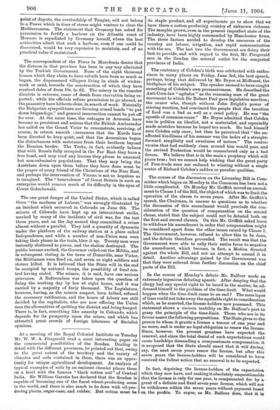The centenary of Cobden's birth was celebrated with enthu• siasm
in many places on Friday, June 3rd, the best speech, perhaps, being that delivered by Mr. Bryce at Midhurst, the birthplace of his subject. The speaker seemed to have caught something of Cobden's own persuasiveness. He described the Anti-Corn-law "agitator" as the reasoning man of the great movement to which Sir Robert Peel gave legislative sanction; the orator who, though without John Bright's power of stirring emotion, had convinced the people that the taxation of food was a bad as well as a cruel policy. He was "the apostle of common-sense." Mr. Bryce admitted that Cobden was in politics an idealist, not a materialist, and repeatedly made mistakes because he hoped too much. He had himself seen Cobden only once ; but then he perceived that "the un- affected kindliness of his manner was the index of a straight- forward simplicity and sweetness of nature." The contro- versies that had suddenly risen around him would pass, and the revived Protection would be remembered only as a bad dream. We believe that is in the main a prophecy which will prove true ; but we cannot help wishing that the great party of Free-trade were not reduced to winning without a single orator of Richard Cobden's calibre or peculiar qualities.










































 Previous page
Previous page